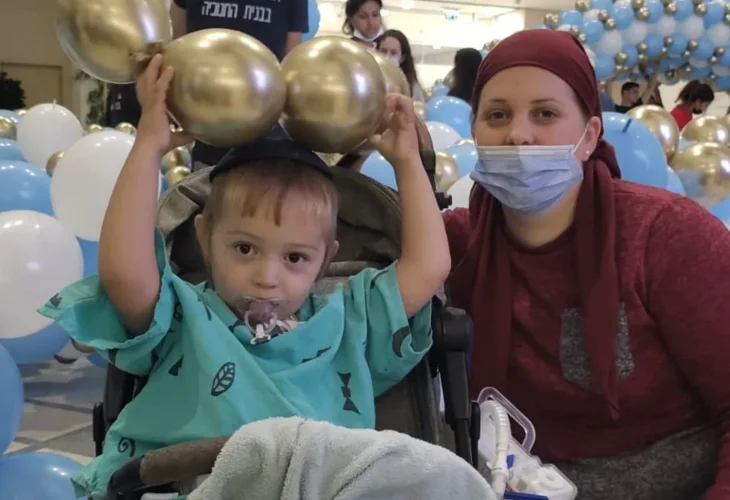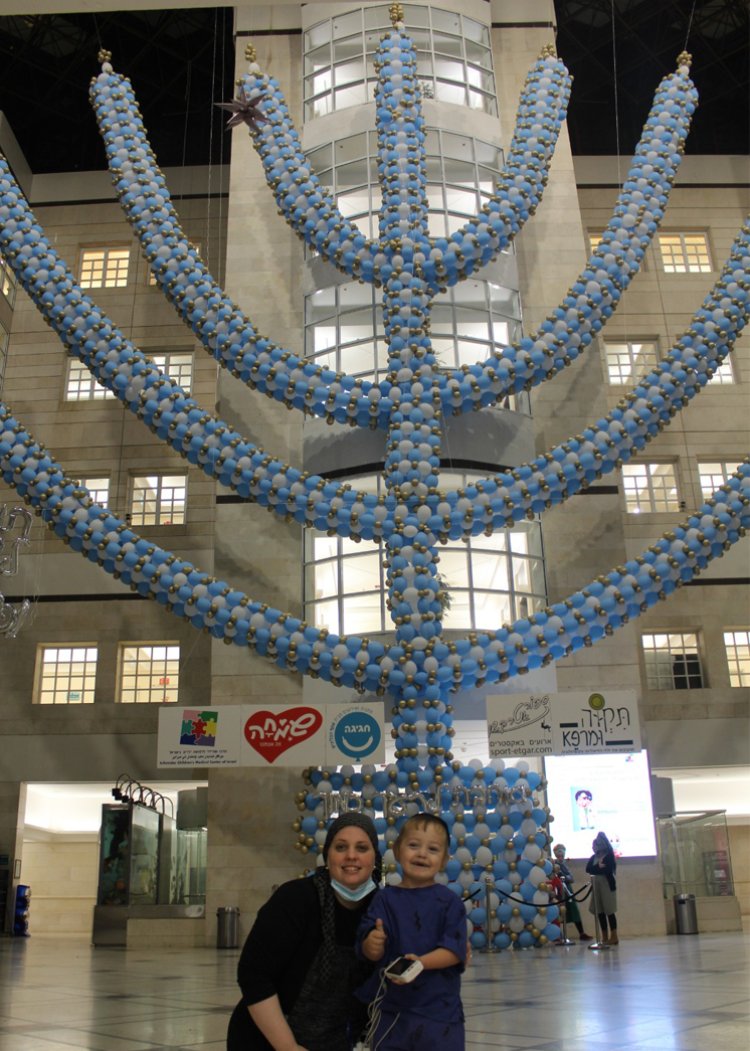"Our Doctor Told Us: 'Your Son is a Ticking Bomb'"
Elchanan Stern's journey is anything but ordinary. From a month-long hospital stay post-birth and multiple surgeries to his parents' unwavering faith, it's a story of miracles and hope. "We've witnessed great miracles so far, and we believe that more are to come," says his mother.
 Bilha Stern with her son Elchanan
Bilha Stern with her son ElchananBilha Stern cannot forget that moment: she went for a routine ultrasound about three months before her son's birth, when the technician casually mentioned they needed to refer her for a fetal echocardiogram. "The technician didn't explain further," Bilha recalls, "because she wasn't a doctor and it wasn't her responsibility, and we weren't worried. Only now, in hindsight, I know that was the first warning sign that something wasn't right with our baby."
Bilha takes a deep breath as she recounts that period. The tiny baby born three months later is no longer so tiny. Today, he is seven years old and studies at a regular yeshiva, but what he and they have endured since his birth could fill a hefty book. "He gave us a real education in medical terms we knew nothing about, fears we'd never experienced, and above all, a deep love and understanding of how much our children mean to us and the lengths we will go for them," Bilha says.

Challenging Diagnosis
The ultrasound that sparked their concern left Bilha calm, but a week later, she realized the situation was far more serious. "The technician called my personal number asking, 'Have you scheduled the appointment? Have you had the test?'" she recounts. "It dawned on me that these were not mere figments of my imagination but a very real concern. I started to panic, praying that everything would go well, without truly understanding what I was praying for."
The appointment was set, but weeks passed before it was conducted. The cardiologist's verdict: "The left half of the baby's heart hadn't developed," he determined. He explained it was often accompanied by other complexities.
The prognosis was grim. "The cardiologist explained the seriousness," Bilha clarifies, "outlining a series of surgeries: 'The first surgery immediately post-birth with high mortality risk, a subsequent less risky second surgery but with potential complications, and finally, a third surgery also carrying significant risks.' He noted that there is no way to predict the child’s outcome, but about 20% of babies with this defect die during the first surgery, and of those who survive, many may still be severely affected. He made it clear our child would be impaired, undergo many surgeries and procedures, leading to poor life quality and a short life expectancy."
How did you cope as parents receiving such a diagnosis?
"Initially, we were in complete shock. We couldn't believe it was happening to us. Over time, our belief strengthened that everything happening around us was for the best. During those days, my husband sought blessings from righteous individuals, one of whom blessed him with 'a healthy, beautiful child like yourself.' My husband asked if we should try a different hospital, one without the specialized cardiac defect experts, but the rabbi advised to heed the doctors."
Finally Home
The real challenge began after Elchanan's birth. He underwent surgery at six days old and stayed at the hospital for nearly a month. "We live in the north, but I never left Elchanan's side, and my husband was with us most of the time," Bilha shares. "We both felt that our presence contributed significantly to his recovery. We later realized just how precarious Elchanan's situation had been, and when he turned a month old, the doctors released us home."
Returning home was not the relief one might expect. "Among the discharge instructions was to 'try not to let the baby cry too much.' It was incredibly challenging, but we understood crying could lead to exertion and reduce his saturation levels dangerously. Fortunately, Elchanan was a calm baby, but we had to remain constantly vigilant."
"Moreover, doctors advised us to rush to the ER if Elchanan developed a fever, which happened frequently. In one of those hospitalizations, a doctor described Elchanan as a 'ticking bomb.' At first, we thought she was exaggerating, but now we fully comprehend the comment. We've met other parents with similarly affected children and learned that at Schneider alone, an average of two heart surgeries on children are performed daily—many achieve normal, healthy lives, some require long-term follow-up, and others, sadly, don't survive the surgery or pass away suddenly afterward."
Faith and Trust
What is Elchanan's routine like now?
"The truth is, even now at seven, there's no real routine," says Bilha. "While he has a regular schedule, we're always vigilant. He also needs medication three times a day, which requires a prescription from a doctor, then ordering it at the pharmacy, and picking it up later. Some medications need refrigeration and have a short shelf life. Routine life revolves around him, requiring constant attention, and yes, there are still occasional hospital stays and procedures."
What helps you cope with all of this?
"Our faith in Hashem strengthens us deeply," Bilha asserts. "Throughout it all, amidst challenges, we’ve seen so many little miracles—a successful test result, kind people helping us, calm older children. The greatest gift was our daughter born a year after Elchanan. Suddenly, we could appreciate her health; it wasn’t something we took for granted. Personally, I'm bolstered by the belief that if Hashem sent my child into this world in such a fragile body, he must be destined for great things, perhaps to be a Torah scholar."
"Sadly, not many people understand what we go through. For years, we sought an organization for support and found none. A fellow heart child's mother told me it was easier with their daughter who had cancer, as there were charitable supports available. Children with heart issues remain invisible."
This realization led Bilha to establish 'Levavi - Parents for Heart Children,' a foundation to support families with heart-affected children, offering support and bureaucratic assistance. "Since we began, we’ve encountered many similar cases. Parents share their stories, often in tears, and say it's the first time someone truly understands their struggles. Our work involves providing relevant information and technical aid, and we relentlessly advocate for the rights these families deserve. It's unacceptable that these children don't receive medical assistance during school hours or miss annual school trips due to lack of accommodations. Raising awareness within the community is also crucial, and we have many plans for the foundation."
Do you sometimes think about what the future holds?
"Of course, those thoughts come up," Bilha admits. "I know the diagnosis is tough, but over the past year, we've all seen how no one has guarantees. There are so many who seemed healthy and are sadly no longer with us. Though we want to give everything to our children, not everything is in our hands. The key is to have faith and trust in Hashem. Knowing all the miracles we've experienced so far, it's certain more will come."

